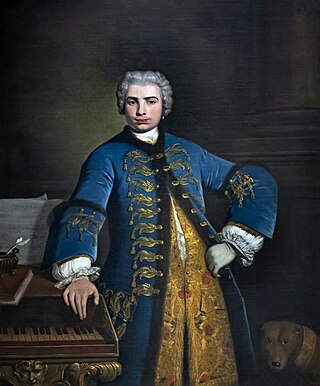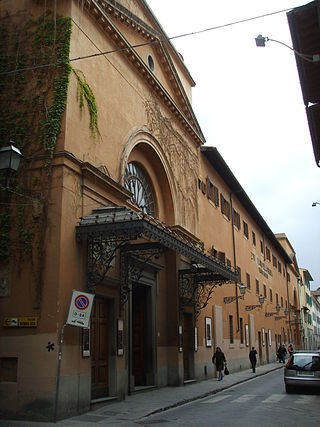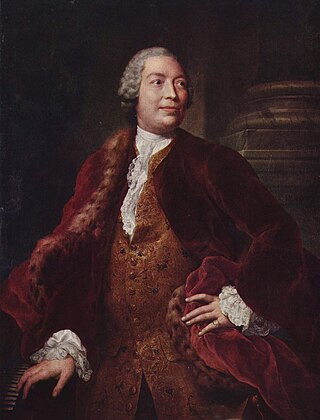
Farinelli was the stage name of Carlo Maria Michelangelo Nicola Broschi, a celebrated Italian castrato singer of the 18th century and one of the greatest singers in the history of opera. Farinelli has been described as having had soprano vocal range and as having sung the highest note customary at the time, C6.

Pietro Antonio Domenico Trapassi, better known by his pseudonym of Pietro Metastasio, was an Italian poet and librettist, considered the most important writer of opera seria libretti.

Opera seria is an Italian musical term which refers to the noble and "serious" style of Italian opera that predominated in Europe from the 1710s to about 1770. The term itself was rarely used at the time and only attained common usage once opera seria was becoming unfashionable and beginning to be viewed as something of a historical genre. The popular rival to opera seria was opera buffa, the 'comic' opera that took its cue from the improvisatory commedia dell'arte.

NicolaAntonio Giacinto Porpora was an Italian composer and teacher of singing of the Baroque era, whose most famous singing students were the castrati Farinelli and Caffarelli. Other students included composers Johann Adolph Hasse, Matteo Capranica and Joseph Haydn.

Gaetano Majorano was an Italian castrato and opera singer, who performed under the stage name Caffarelli. Like Farinelli, Caffarelli was a student of Nicola Porpora.

Antonio Montagnana was an Italian bass of the 18th-century who is best remembered for his association with the composer George Frideric Handel, in whose operas Montagnana sang.

Caterina Gabrielli, born Caterina Fatta, was an Italian coloratura singer. She was the most important soprano of her age. A woman of great personal charm and dynamism, Charles Burney referred to her as "the most intelligent and best-bred virtuosa" that he had ever encountered. The excellence of her vocal artistry is reflected in the fact that she was able to secure long-term engagements in three of the most prestigious operatic centers in her day outside of Italy.
Francesca Bertolli was an Italian contralto of the 18th century. She is best remembered for her association with the composer George Frideric Handel, in whose operas she sang.

Antonio Salvi was an Italian physician, court poet and librettist, active mainly in Florence, Italy. He was in the service of the grand-ducal court of Tuscany and the favourite librettist of Prince Ferdinando de' Medici. Salvi was one of the developers of the opera seria.

Domenico Annibali was an Italian castrato who had an active international career from 1725–1764. He began his career in his native country and was then committed to the Grosses Königliches Opernhaus in Dresden from 1729 until his retirement from the stage 35 years later. In Dresden he excelled in the operas of Johann Adolph Hasse, notably creating roles in the premieres of two of his operas. He was also admired there in works by Nicola Porpora.

In music history, the Neapolitan School is a group, associated with opera, of 17th and 18th-century composers who studied or worked in Naples, Italy, the best known of whom is Alessandro Scarlatti, with whom "modern opera begins". Francesco Provenzale is generally considered the school's founder. Others significant composers of this school are Giambattista Pergolesi, Domenico Cimarosa and Giovanni Paisiello.
It is with the Neapolitan school...that the History of Modern Music commences—insofar as that music speaks the language of the feelings, emotions, and passions.
The Real Compañía Ópera de Cámara de Barcelona orchestra (RCOC) is a Spanish early music ensemble based in Barcelona. It was founded by its conductor Juan Bautista Otero. The orchestra has been instrumental in reviving several long unperformed Baroque operas.

Amazonas Baroque Ensemble - ABE is a period instruments group based on Manaus, Amazonas, Brasil. Its members join themselves in Amazonas State University as music and musicology teachers and former students. Their aims included restoration of ancient Brazilian and Portuguese repertory, in a historically inspired approaching. Many of them joined musicological research and practical performance projects sponsored by local and federal government agencies, such as Fundação de Amparo à Pesquisa do Amazonas, Petrobrás, Eletrobrás, among others. At this moment ABE performed in many Brazilian and European cities, including festivals and stage productions.

Franco Maximiliano Fagioli is an Argentine operatic countertenor.

Mitridate is an opera by Nicola Antonio Porpora to a libretto by Filippo Vanstriper premiered in Rome in 1730. Porpora and revived and revised the work for London (1736) with actor-manager and librettist Colley Cibber in direct competition with Handel's opera house. The London version of the opera was performed for the 250th anniversary of Porpora's death at the Festival "Winter in Schwetzingen" Directed by Jacopo Spirei, conducted by Felice Venanzoni.

Dilyara Idrisova is a Russian soprano opera singer and recitalist, specialising in soprano and coloratura mezzo-soprano material of the 18th and 19th century. She studied with Milyausha Murtazina and Galina Pisarenko.
Edward Foreman was an American operatic bass, scholar of singing technique, and teacher. He was founder and editor of the Pro Musica Press (Minneapolis), which reprinted historical treatises in facsimile and transcription, and also translated them into English. According to Richard Wistreich, these translations offer a uniquely comprehensive and valuable collection of Bel Canto pedagogy in English. He argues that "a growing number of influential singing teachers […] agree [with Foreman]", that there should be a revival of those old, healthy, singing practices.

Semiramide is a dramma per musica in three acts by Antonio Vivaldi composed to a libretto by Francesco Silvani.













